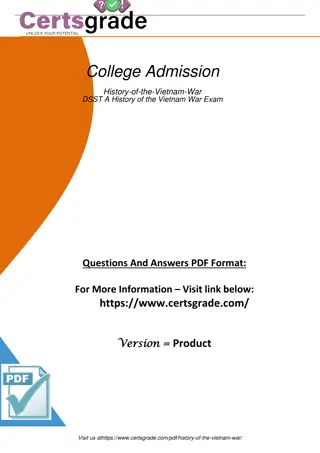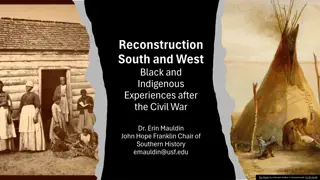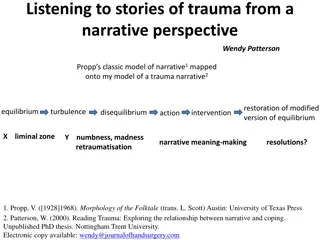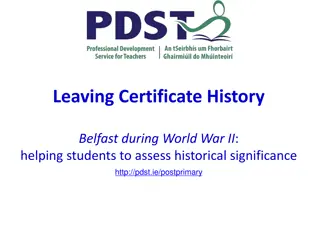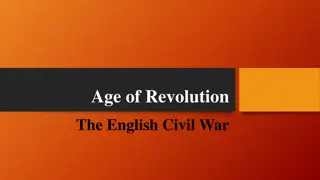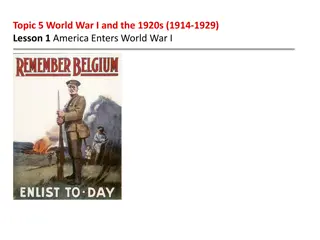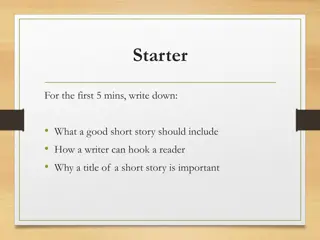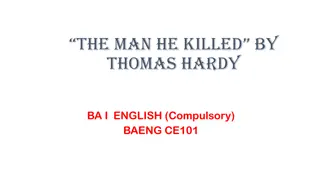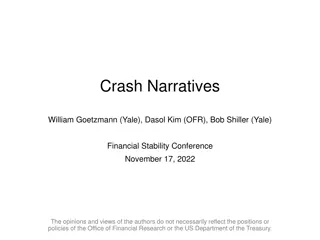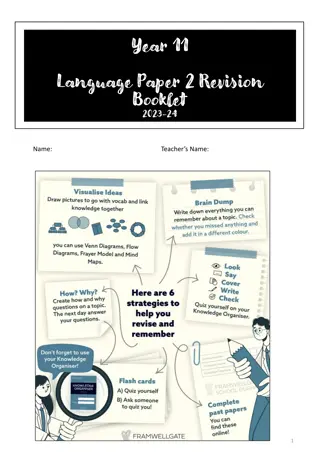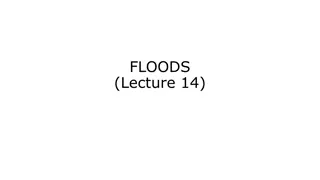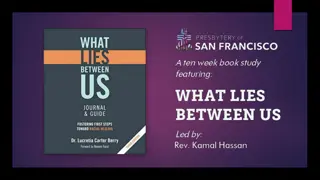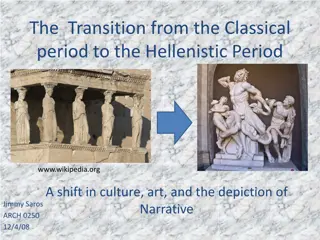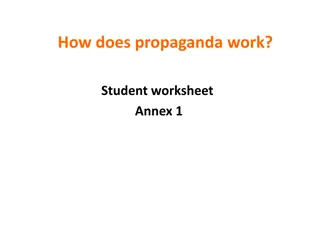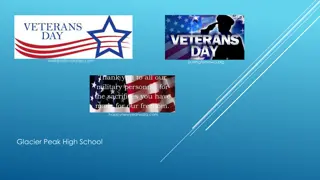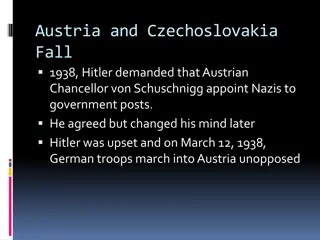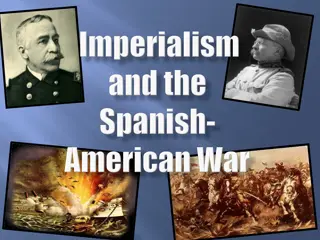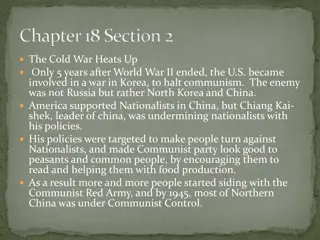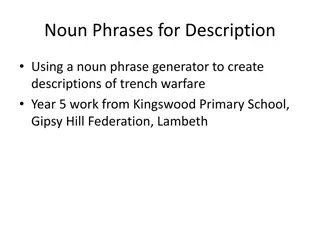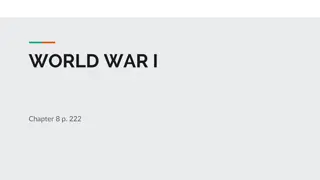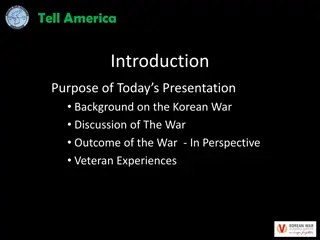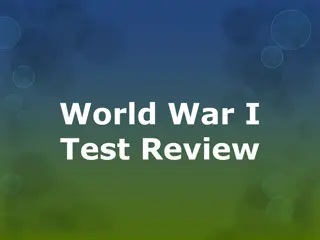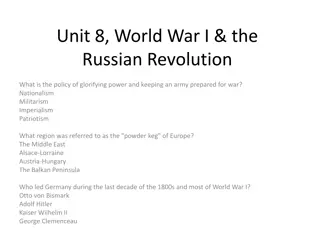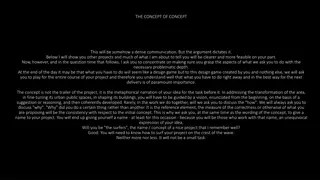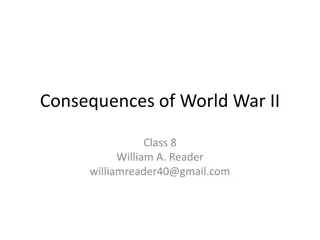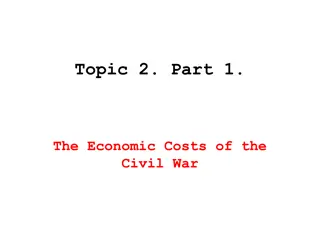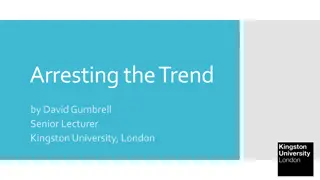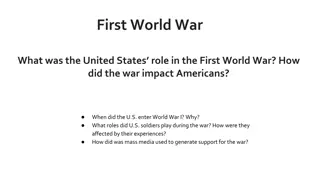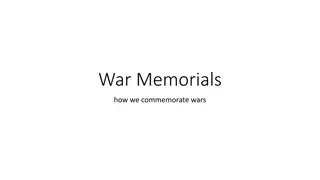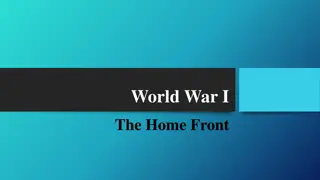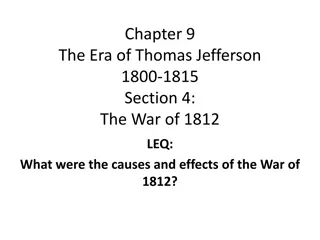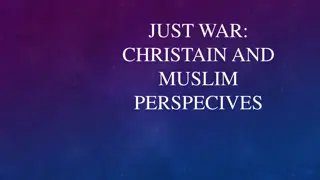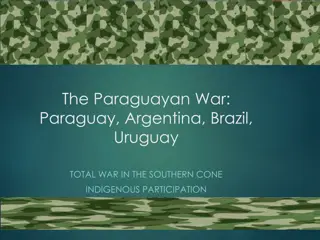❤[PDF]⚡ Civil War Talks: Further Reminiscences of George S. Bernard and His Fel
\"COPY LINK HERE ; https:\/\/getpdf.readbooks.link\/0813931754\n\nRead ebook [PDF] Civil War Talks: Further Reminiscences of George S. Bernard and His Fellow Veterans (A Nation Divided: Studies in the Civil War Era) | Civil War Talks: Further Reminiscences of George S. Bernard and His Fellow Vetera
1 views • 6 slides
Dominate the DSST A History of the Vietnam War Exam
Arm yourself with comprehensive study materials and expert guidance to conquer the DSST A History of the Vietnam War Exam. Unlock success with practice tests, study guides, and proven strategies. Start your journey to victory today!\nClick Here to Get History-of-the-Vietnam-War Dumps With 16 USD Dis
1 views • 6 slides
Post-Civil War Experiences in the South and West
Explore the intertwined experiences of Black and Indigenous communities in the aftermath of the Civil War, shedding light on the challenges and conflicts faced in the South and West regions. Delve into the complexities of Reconstruction, the impact of the Civil War on Indigenous peoples, and the pre
1 views • 24 slides
Understanding Trauma Narratives: A Narrative Perspective
Exploring trauma narratives through the lens of Wendy Patterson Propp's classic narrative model, this study delves into the restoration of equilibrium, the disruption of disequilibrium, and the intervention actions within the liminal zones of trauma narratives. It emphasizes narrative meaning-making
5 views • 5 slides
Exploring Historical Significance of Belfast During World War II
Assisting students in assessing the historical significance of Belfast during World War II through an enquiry-focused approach. The content covers key aspects such as the impact of World War II on Belfast, its strategic importance, political leadership, the Belfast Blitz of 1941, and key terms relat
0 views • 32 slides
The English Civil War and the Rise of the Stuart Dynasty
The English Civil War marked the end of the Tudor dynasty and the rise of the Stuart Dynasty in England. It was a time of conflict between the monarchy and Parliament, with issues revolving around divine right, religion, and political power. Leaders like James I and Charles I faced opposition from P
0 views • 13 slides
America's Entry into World War I: Causes and Impacts
World War I and the 1920s witnessed America's transition from neutrality to active involvement in the war. Factors such as nationalism, militarism, imperialism, and alliances led to the conflict. The impact of technological innovations resulted in stalemate on the Western Front, leading to significa
0 views • 11 slides
The Homefront: U.S. War Production Efforts During World War II
During World War II, the United States mobilized its industries for total war production, converting peacetime factories into facilities for producing planes, tanks, rifles, and more. The U.S. became the Allies' biggest armaments supplier, producing millions of war supplies and significantly boostin
2 views • 25 slides
Flowers of War: Margaret's Evacuation in the Highlands
In the short story "Flowers" by Robin Jenkins, set during World War Two in the Highlands of Scotland, Margaret experiences the challenges of war, loss of innocence, and isolation after being evacuated. The title serves as a metaphor, hinting at deeper themes within the narrative. Through the charact
5 views • 21 slides
Analysis of "The Man He Killed" by Thomas Hardy and Its Historical Context
Thomas Hardy's poem "The Man He Killed" explores the senseless nature of war through the perspective of a soldier who reflects on killing an enemy soldier whom under different circumstances, they could have shared a drink with. Set during the Second Boer War, the poem highlights the arbitrary nature
0 views • 12 slides
Origins of the Cold War: Yalta and Potsdam Conferences 1945
The Cold War's origins stem from the tensions and suspicions between the USSR and the West post-World War II, highlighted through conferences like Yalta and Potsdam. At the Yalta Conference, held in February 1945, crucial decisions were made regarding Germany, Poland, and the UN. The Potsdam Confere
0 views • 10 slides
Understanding the Role of Media Narratives in Shaping Market Perception
This paper delves into the impact of financial media narratives post-market crashes and their influence on collective memory, investor behavior, and market volatility. It highlights the association between crash narratives, market indicators, and investor responses, emphasizing the contagious nature
0 views • 22 slides
Insights into World War Two and Adolf Hitler's Role
World War Two started on September 3, 1939, with Britain and France declaring war on Germany. Adolf Hitler's rise to power, initiation of the war, and involvement in the Holocaust are highlighted. The Star of David symbolized Jewish identity under Hitler's rule, and the Holocaust saw six million Eur
0 views • 6 slides
Analysis of War Experiences: 1854 vs. 1918
A comparison of war accounts from 1854 and 1918, highlighting the futile nature and devastating consequences of conflicts. The juxtaposition of "The Charge of the Light Brigade" and Gunner William Towers' personal experience sheds light on the horrors and sacrifices of war, contrasting heroic valor
0 views • 46 slides
Ancient Flood Narratives: Sumerian, Babylonian, and Hebrew Accounts
Ancient flood narratives from Sumerian, Babylonian, and Hebrew sources depict stories of divine displeasure, flood planning, and survival through boat-building. Enlil, Enki, and Yahweh play key roles in warning individuals like Uta-napishtim, Atrahasis, and Noah to build boats and save life forms du
0 views • 8 slides
Childhood Obesity Prevention Narratives Study
Feedback was obtained on childhood obesity prevention narratives from Mexican American mothers of children aged 3-4 in a study conducted by researchers at the University of South Carolina. The study involved face-to-face interviews and exposure to different narratives, aiming to address children's c
0 views • 22 slides
Exploring Race Narratives and Identity in Small Group Discussions
Delve into the impact of race narratives on personal identity through small group conversations guided by respectful communication guidelines and a kaleidoscope Bible study process. Participants reflect on Bible passages and share insights on how racial narratives have shaped their sense of self.
0 views • 13 slides
Transition from Classical to Hellenistic Period: Art and Narratives
The evolution from the Classical period to the Hellenistic period in Ancient Greece brought significant shifts in culture, art, and storytelling. Classical art focused on idealized human forms and naturalistic poses, while Hellenistic art embraced more dramatic expressions and emotions. The narrativ
0 views • 23 slides
Analysis of W.B. Yeats' Poetry During World War I
W.B. Yeats' poetry during World War I reflects a unique perspective on the conflict, as seen in works like "An Irish Airman Foresees His Death" and "On Being Asked for a War Poem." Delving into themes of sacrifice, duty, and the futility of war, Yeats offers a contrasting view to the graphic realism
0 views • 7 slides
Understanding the Mechanisms of Propaganda Through Historical Examples
Explore the workings of propaganda through historical artifacts from World War I, showcasing how nations used persuasive messaging to influence public opinion, rally support for war efforts, and shape cultural narratives. Images of propaganda posters and war bonds illustrate the powerful impact of v
0 views • 24 slides
Stories of World War I: Soldiers' Narratives & Perspectives
Explore a collection of works that delve into the personal experiences, emotions, and challenges faced by soldiers during World War I. From poems and songs written on the battleground to intimate letters and memoirs, these narratives provide poignant insights into the human side of war, shedding lig
0 views • 20 slides
Timeline of Key Events Leading to World War II
In the years leading up to World War II, a series of significant events unfolded in Europe. From Hitler's demands and annexations to the signing of pacts and the invasion of Poland, tensions escalated rapidly. The Munich Agreement, German offensive in Poland, declaration of war by France and Britain
0 views • 12 slides
The Impact of the Korean War on Global Relations
The Korean War, often dubbed the "Forgotten War," had significant implications on global politics and relationships. This conflict was characterized by a mix of conventional and guerilla warfare tactics. China's involvement in the war had a profound impact on its relations with the U.S. and the U.S.
0 views • 14 slides
The Spanish-American War: Origins and Impact
The Spanish-American War was fueled by a combination of factors including economic struggles, imperial ambitions, and sensationalist journalism. Theodore Roosevelt's stance on war, coupled with the desire for Cuba's independence from Spain, led to a call for war in the late 1890s. Yellow journalism
0 views • 18 slides
The Cold War Heats Up: Korea and China Conflict
The post-World War II era saw the U.S. engaging in the Korean War to combat communism, facing off against North Korea and China instead of Russia. Conflict in China between the Nationalists led by Chiang Kai-shek and the Communists under Mao Tse-tung intensified, with Chiang's authoritarian rule spa
0 views • 14 slides
Echoes of Trench Warfare: A Poetic Reflection on the First World War
Immersive and evocative descriptions of trench warfare come to life in this collection of noun phrases and extended phrases, capturing the suffering and humanity of soldiers during the tumultuous times of the First World War. From exhausted soldiers to ghostly shells and red poppies, the imagery pai
0 views • 6 slides
Causes and Outbreak of World War I
Various factors such as nationalism, imperialism, militarism, and the assassination of Archduke Francis Ferdinand led to the outbreak of World War I. The tensions in Europe escalated as countries formed alliances and mobilized for war. The conflict resulted in early battles like the Battle of Marne
0 views • 23 slides
Overview of the Korean War: Background, Discussion, and Outcome
This presentation delves into the background of the Korean War, highlighting the historical context from the Korean Peninsula's division after World War II to the outbreak of the conflict in 1950. It discusses the involvement of North and South Korea, as well as key players like the United States, t
0 views • 15 slides
World War I Test Review and Historical Overview
Learn about the key terms and concepts related to World War I, including militarism, nationalism, neutrality, propaganda, espionage, and more. Explore the long-term causes of the war, the immediate trigger, the Central Powers and Allied Powers involved, as well as important events like the Zimmerman
0 views • 13 slides
World War I and the Treaty of Versailles: Key Events and Consequences
The policy of glorifying power and militarism, the tensions in the Balkan Peninsula, Germany's leadership, causes of the United States' entry into World War I, impact of unrestricted submarine warfare, transition to total war, the end of the war with an armistice, the Treaty of Versailles assigning
0 views • 10 slides
Exploring the Depth of Conceptual Narratives in Urban Design Projects
Delve into the intricate world of conceptual narratives in urban design where projects are shaped by metaphoric narrations and reasoning. Discover the importance of developing a coherent vision and giving a distinct name to your project to embody your idea effectively. Embrace the challenge of surfa
0 views • 12 slides
The Impact of World War II on Japan and the Emergence of the Cold War
World War II had far-reaching consequences on Japan, leading to significant naval battles, intense fighting in Okinawa, and ultimately, the country's surrender following the atomic bombings of Hiroshima and Nagasaki. The post-war period saw the emergence of the Cold War as tensions rose between the
0 views • 63 slides
The Economic Costs of the Civil War and Its Impact on Growth
The Civil War led to significant economic costs for both the North and the South, including direct expenses such as government spending, destruction of physical and human capital, and indirect costs due to reduced consumption. The war resulted in massive casualties and had a profound impact on the e
0 views • 34 slides
Exploring Teacher Retention Through Personal Narratives
This study examines the consistent teacher retention rates since 2010 and delves into the lived experiences of educators through their narratives. The research highlights the importance of looking towards the future in the field of education to inspire new narratives for Early Career Teachers (ECTs)
0 views • 32 slides
The United States in World War I: Impact, Soldiers' Experiences, and Media Support
The United States played a significant role in World War I, entering the war in 1917 and sending soldiers to fight in Europe. The war impacted Americans socially and economically. U.S. soldiers served in various roles and were affected by their experiences. Mass media was used to generate support fo
0 views • 15 slides
Honoring Sacrifice: War Memorials Across the Globe
Explore a visual journey through various war memorials such as the Boer War Memorial in Belfast, the Menin Gate in Ypres, the Cenotaph in London, the Tomb of the Unknown Warrior in Westminster Abbey, the Korean War Veterans Memorial in Washington DC, the Vietnam Veterans Memorial Wall in Washington
0 views • 9 slides
America's Role on the Home Front during World War I
During World War I, America witnessed significant changes on the home front as the government took on new powers to regulate industry, agriculture, and public opinion. Women and minorities played crucial roles, voluntary rationing was embraced, and opposition by conscientious objectors was met with
0 views • 24 slides
The War of 1812: Causes, Events, and Effects
The War of 1812 was influenced by issues such as British impressment of American sailors, arming Native Americans, and trade restrictions. Despite opposition, President James Madison declared war in 1812. The conflict marked a period of American nationalism, with War Hawks pushing for war and Doves
0 views • 16 slides
Perspectives on Just War Theory from Christian and Muslim Standpoints
Just War Theory, rooted in Christian philosophy, aims to justify the use of force in specific circumstances to defend justice and protect human life. While pacifists reject all forms of war, adherents of the theory believe in certain criteria that must be met for a war to be considered just, such as
0 views • 16 slides
The Paraguayan War: Total Conflict in the Southern Cone
The Paraguayan War, also known as the War of the Triple Alliance, involved Paraguay, Argentina, Brazil, and Uruguay in a brutal conflict from 1864 to 1870. President Carlos Antonio López's policies and the ambitions of Francisco Solano López led to Paraguay's defiance of its neighbors, resulting i
0 views • 10 slides
![❤[PDF]⚡ Civil War Talks: Further Reminiscences of George S. Bernard and His Fel](/thumb/20551/pdf-civil-war-talks-further-reminiscences-of-george-s-bernard-and-his-fel.jpg)
